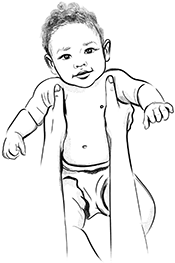Coping with your feelings

Having a new baby is often a happy time. It can be stressful too. You may have different feelings about many things, including the right way to feed your baby. This is normal. We recommend speaking to a trusted healthcare professional, support worker or other mothers living with HIV to discuss how to manage all of these feelings. Here are some common feelings about feeding your baby and ideas about what you can do:

People might say insensitive things. You cannot prevent this, but being prepared for it can help you manage your reaction.
- Have you heard the saying “breast is best” or people criticizing mothers who do not breastfeed? Hearing these types of comments can hurt. They do not take into account the many mothers like you who do not breastfeed. Besides HIV, there are other reasons why breastfeeding may not be the best or safest option for a baby. Sometimes it helps to know that there are many other mothers out there who do not breastfeed their babies.
- You might worry about the impact of formula feeding on your baby’s immune system because your baby is missing breast milk. Don’t worry; your baby’s immune system will build over time, with or without breastfeeding.
- Some mothers worry about not bonding with their baby because they are not breastfeeding. You can bond with your baby in many other ways. Some ways to bond with your baby include hugging or snuggling your baby, singing to your baby and holding your baby against your bare skin. Responding to your baby’s needs is also a form of bonding. Every interaction between you and your baby is an opportunity to bond.
- Not breastfeeding can bring up feelings of sadness because you might worry that feeding your baby formula is not as healthy as breastfeeding. Others describe a feeling of loss or grief. If you have these feelings, talk about them with someone you trust. Remember that formula is a healthy substitute for breast milk. Infant formula is made to meet the needs of your baby.
- Before your baby is born, it is a good idea to get advice on breast health so you know what to do when your breast milk starts to come in and how to stop the breast milk after your baby is born. You can also ask about preparing formula. It is recommended that you speak to a health care professional about the safest way to prepare formula. If you are worried about mixing formula, you should ask about pre-mixed formula.
- Some mothers are open about their HIV status and are comfortable explaining why they are formula feeding. Some other mothers worry that by feeding their baby formula others will know that they have HIV. This leads to some mothers avoiding other people sometimes. It is true that friends and family may ask you why you are not breastfeeding. It can help to have something to tell these people if you’re not comfortable talking about your HIV status. “Reasons for formula feeding” (below) lists some reasons why women do not breastfeed. It may help to discuss how to talk to people about this issue with a trusted healthcare professional, support worker or another mother living with HIV. We recommend that you give the same reason to everyone so there is no confusion for you or them. It is important that you are comfortable with what you decide to tell others.
- People might say insensitive things to you about infant feeding. Even trained professionals might forget why you are formula feeding. While there is no way to prevent this from happening, being prepared can sometimes help you manage your feelings in the moment.
Reasons for formula feeding
- My baby didn’t latch well.
- I decided to bottlefeed because it allows other people to take part in feeding and bonding with my baby.
- My doctor advised me to formula feed because the baby wasn’t gaining weight.
- I wasn’t making enough milk for my baby’s needs.
- I decided not to breastfeed.
- I prefer bottle feeding.
- My baby doesn’t breastfeed well.
- I needed to take a medication after delivery that made it not safe for my baby to breastfeed.
